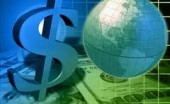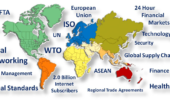Re Ian Bremmer 'Could third-party candidates upend the 2024 US election?' 3 April The current political movement in the USA…
Wednesday Night #1716
Written by Diana Thebaud Nicholson // January 21, 2015 // Wednesday Nights // Comments Off on Wednesday Night #1716
The furor over Charlie Hebdo has not died down, but the attention of the world is turning this week to two events.
But before we go there, we should call attention to the views of our two Wednesday Night Davids:
David (Jones) After Paris: No more politeness, the time for action is at hand
vs.
David (Kilgour) After Paris: Effort should be spent on understanding faith communities, not hatred
Tuesday’s State of The Union Address is summarized (in advance) by Forbes in five words: More spending, dependency–and regulation, adding: Obama can count on contradictions in Republicans’ presumed support for economic liberty and exploit that, too. There’s an odd bipartisan consensus that, while incompetent to make paper clips, the federal government should nonetheless spearhead things like “basic” research, cybersecurity policy, education funding, green and renewable energy, infrastructure and education funding.
Politico offers a gamut of predictions State of the Union 2015: Will there be any surprises? from ‘experts’ of all political stripes. Ana Navarro, Republican strategist comments: Hell, who knows. Maybe Raúl Castro will be sitting in the first lady’s box.” Actually, not likely, according to
Who’s sitting with Michelle Obama at State of the Union which points out that “The first lady’s guests are often hints at big applause lines the White House has planned for the president’s speech.”All will be revealed and ready for dissection on Wednesday Night.
And there is Davos (World Economic Forum as it prefers to be known). The Agenda is public, so The Guardian could make more than educated guesses in Sunday’s Seven themes that will dominate Davos 2015 – World leaders, top business people and campaigners will be debating issues from climate change to political instability at the World Economic Forum this week.. Meanwhile The Telegraph lists 13 people everyone will be talking about out of the 2,500 participants from over 90 countries, including 40 heads of state. Mark Carney makes the list. Wednesday Nighter economist Brett House, a Young Global Leader, reports that Oxfam put inequality firmly on the Davos agenda with the launch of its report “Wealth: Having it all and wanting more” adding “The jump in inequality is a direct by-product of our response to the financial crisis. Quantitative easing has made liquidity cheap, and these funds have been plowed into tangible assets like real estate and art. If you were already rich, the crisis has probably made you richer.” And speaking of the richer, CNN Money headlines Jets clogging Swiss airports in Davos scramble — Roughly 1,700 private flights are expected over the course of the week, which is twice as many as normal. But of course, Cheap oil means cheaper private jets.
It is ironical that the glitterati assemble in Europe at a time when so many are deploring the state of the EU.
Chris Ragan writes in the Gobe & Mail [Blame Germany for Europe’s economic nightmare]: “Since mid-2010, after the worst part of the global financial crisis was over, Europe has desperately needed two things to advance its moribund economy.
The first is that European countries have needed fiscal stimulus rather than fiscal austerity. What happened instead was immediate fiscal austerity, driven largely by leaders from Germany and other northern European states. … The second thing Europe has desperately needed since 2010 is for the European Central Bank (ECB) to follow the lead set by the U.S. Federal Reserve in massively expanding its balance sheet. In fact, since mid-2012, while the Fed’s balance sheet grew by well over $1-trillion, the ECB’s balance sheet actually contracted by the same amount. Now they’re talking, again, about trying QE in earnest.
As long as Germany’s leaders stick to their current views, these tools will remain unused and the European economic nightmare will continue.” Making his point, is this in Tuesday’s Financial Times German media attack eurozone QE plans— Charm offensive by Mario Draghi, ECB president, fails to silence critics.
Compounding Europe’s woes is the fallout from Hebdo Charlie. As George Friedman points out:
Wednesday’s deadly attack against a French satirical publication has the potential to upset relations between European states and their Muslim citizenries. The strategic intent behind such attacks is precisely to sow this kind of crisis, as well as to influence French policy and recruit more jihadists. [Paris Attack Underscores a Deeper Malaise | Stratfor ]
Meanwhile, on the other side of the world, China is quietly – or not so quietly – campaigning to recreate and surpass the glory days of the Silk Road, the ancient trade route that linked East and West at the height of China’s imperial power centuries ago. This, according to CBC’s Patrick Brown, explains “why, in the past two years, Chinese investment in Canada has dropped from billions of dollars a year to next to none, and why no Chinese leader has visited Canada in close to five years.Instead, they are spending their time and money in important places like Maldives, Kazakhstan and Serbia.
It’s like the real estate business. The three most important factors are location, location and location, and Canada is now off the beaten track.” [Orient express, China’s grand plan for a New Silk Road] Not good news for Stephen Harper, but then, he hasn’t had a lot of good news lately.
While everyone obsesses over the announcement of a delay in presenting the federal budget due to economic uncertainty caused by falling oil prices, with pundits and politicians arguing over the merits of the decision, the side bar to the discussion is the continuing question of whether Stephen Harper will call an early election. Seems unlikely unless oil prices take a huge jump and voilà – a balanced budget for which the Conservatives will take all the credit. However, as Konrad Yakabuski points out, “The bigger problem facing the Conservatives, however, is that they staked their reputation as sound economic stewards on Canada’s emergence as an energy superpower, to the point of neglecting challenges elsewhere.” The IMF isn’t optimistic: Canada’s forecast takes hit as IMF cuts global growth outlook.
In light of all this, it will be of particular interest to hear what Justin Trudeau has to say during the LPC caucus meeting. He is to meet with reporters and take questions on economy, jihadists, etc. at noon and will deliver a speech at 6:30 pm Tuesday evening (just before the State of the Union, so not too likely to grab headlines – was the timing of the caucus meeting to coincide with Davos and the SOTU deliberate?).
Something else was postponed – maybe indefinitely? – with nary a peep. Harper postpones Three Amigos summit amid chilly relations with U.S. and Mexico
On the Quebec front, aside from the news about Arthur Porter’s extradition,there is this item The Quebec government has rejected a renewed call by Canada’s official languages commissioner that it create an office of anglophone affairs to better serve the province’s linguistic minority. Sylvia Martin-Laforge comments on behalf of the QCGN. Sylvia also reminds us in another interview that Bill 10 is still a live issue.
Have you been following the latest controversy about sledding? Céline Cooper weighs in with Children today are overprotected – we agree!
If you missed the broadcast, you must see the terrifying Mega-Tsunami from The Passionate Eye Could we survive a mega-tsunami in North America? Using CGI simulations, scientists predict a wave even bigger than the tsunamis in Thailand & Japan could devastate the Atlantic Coast. 17 January 2015
We often add an item “For your reading pleasure”, usually a long analysis piece or two, but here is a Buffet (to borrow from Kimon) Most Anticipated: 2015 Non-Fiction Spring Preview, and if you prefer the lighter side of literature Most Anticipated: 2015 Fiction Spring Preview.



